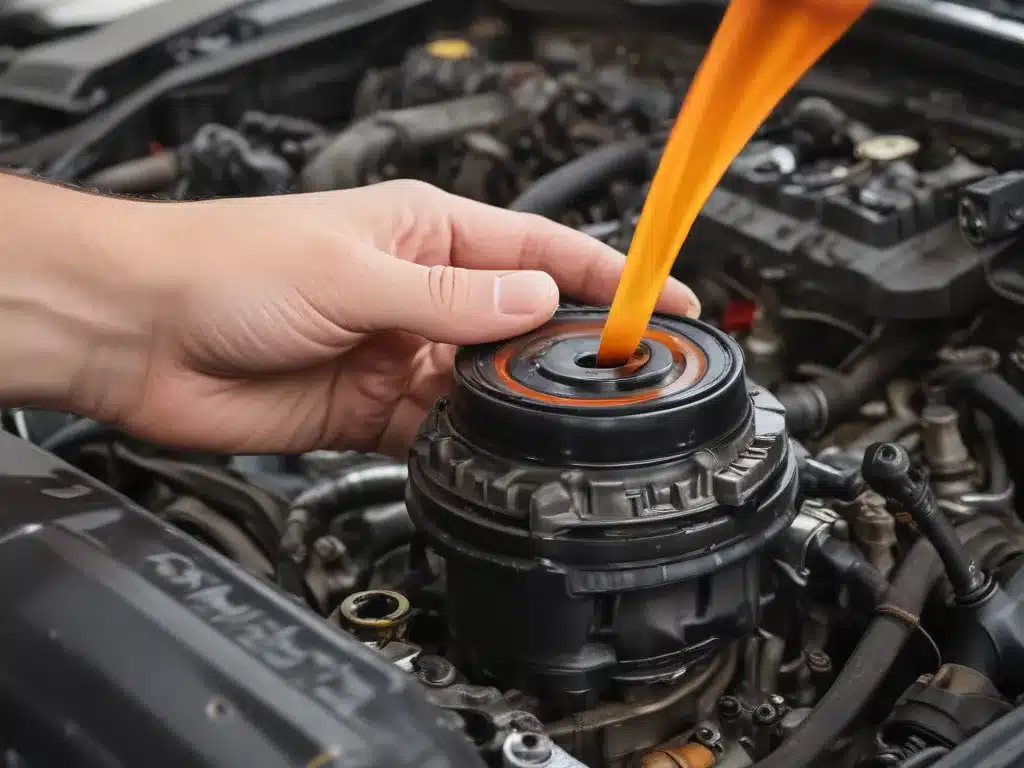
Synthetic Oil and High Mileage Engines: A Match Made in Horsepower Heaven?
As the proud owner of a high-mileage ride, I’ve been through the engine oil woes more times than I can count. The constant battle against that dreaded oil consumption, the endless trips to the auto parts store, and the frantic Google searches trying to find a solution – it’s enough to make any car enthusiast want to hang up their wrench and take the bus.
But what if I told you there might be a magical elixir that could put an end to your high-mileage engine’s oil-burning ways? That’s right, my fellow grease monkeys – I’m talking about the wonders of synthetic oil. Now, I know what you’re thinking: “Isn’t that stuff for fancy pants sports cars? How could it possibly help my beater from the ’90s?”
Well, saddle up, because I’m about to take you on a journey into the world of high-mileage engine maintenance, and trust me, synthetic oil just might be the key to keeping your old workhorse chugging along for years to come.
The Scourge of Oil Consumption: Why High Mileage Engines Burn Oil
First, let’s dive into the root cause of this pesky oil consumption problem. As engines rack up the miles, certain components start to wear down, causing all sorts of issues. Piston rings can become worn and lose their seal, allowing oil to slip past and get burned in the combustion chamber. Valve guides can get sloppy, letting oil seep in and get sucked into the engine. And don’t even get me started on those leaky seals and gaskets – it’s like a never-ending game of “Where’s the Oil Leak?”
Now, traditional mineral-based oils can struggle to keep up with these issues. They just don’t have the same robust properties as their synthetic counterparts. That’s where the magic of synthetic oil comes in.
Synthetic Oil: The Savior of High Mileage Engines?
Synthetic oils are engineered to be more stable, durable, and resistant to the ravages of time and high mileage. They’re made from chemically-modified base stocks, rather than the crude oil that traditional oils are refined from. This gives them a number of advantages that can be a lifesaver for your high-mileage ride.
For starters, synthetic oils have better resistance to thermal breakdown. That means they can better withstand the intense heat and pressure inside your engine, preventing them from breaking down and losing their protective properties. And since they’re more resistant to oxidation, synthetic oils don’t thicken up and turn to sludge as quickly as conventional oils.
But perhaps the most important benefit for high-mileage engines is the superior film strength of synthetic oils. This means they can better maintain a protective barrier between all those worn-out parts, helping to seal in the oil and prevent it from seeping out. It’s like a super-powered force field for your engine!
Real-World Results: Synthetic Oil in Action
Now, I know what you’re thinking – it all sounds too good to be true, right? Well, let me tell you about some real-world examples that prove the power of synthetic oil for high-mileage engines.
Take my buddy Steve, for instance. He’s got an old Chevy Impala with over 250,000 miles on the clock. Used to be, he was topping up the oil every other week just to keep it running. But ever since he switched to a high-quality synthetic oil, that oil consumption has all but disappeared. He’s practically forgotten what the inside of an auto parts store looks like!
And then there’s my neighbor, Janice. Her Honda Civic had developed a nasty oil leak, and the mechanic was telling her it was going to cost a fortune to fix. But after a few oil changes with a synthetic blend, that leak just dried up. She was absolutely stunned – and so was her wallet, in the best way possible.
The Proof is in the Pudding (Or the Oil Filter)
Now, I know what you’re thinking – “That’s all well and good, but how do I know if synthetic oil will work for my high-mileage engine?” Well, fear not, my greasy-handed friend, because there’s a simple test you can do to see the difference for yourself.
The next time you change your oil, take a look at that old filter. If it’s black and gooey, with a ton of sludge build-up, then you know your engine is in desperate need of some synthetic TLC. But after a few oil changes with a high-quality synthetic, you should start to see that filter come out looking a whole lot cleaner – a sure sign that the oil is doing its job and keeping those engine components well-lubricated and protected.
Synthetic Oil: The Key to Longevity for High Mileage Engines
So, there you have it, folks – the lowdown on how synthetic oil can be the savior your high-mileage engine has been searching for. No more constant oil top-ups, no more frantic trips to the mechanic, and no more feeling like your old workhorse is just one breakdown away from the junkyard.
With the right synthetic oil in its veins, your engine can keep on chugging along, mile after mile, year after year. It’s like giving your trusty ride a new lease on life, and trust me, the peace of mind is worth its weight in gold (or, you know, synthetic oil).
So, what are you waiting for? Ditch that old conventional oil and make the switch to synthetic. Your high-mileage engine will thank you – and so will your wallet. Happy motoring, my friends! And remember, if you need any help finding the right synthetic oil for your ride, be sure to check out AutoOilAndFluid.com – they’ve got all the answers (and the products) to keep your engine running smooth as silk.


